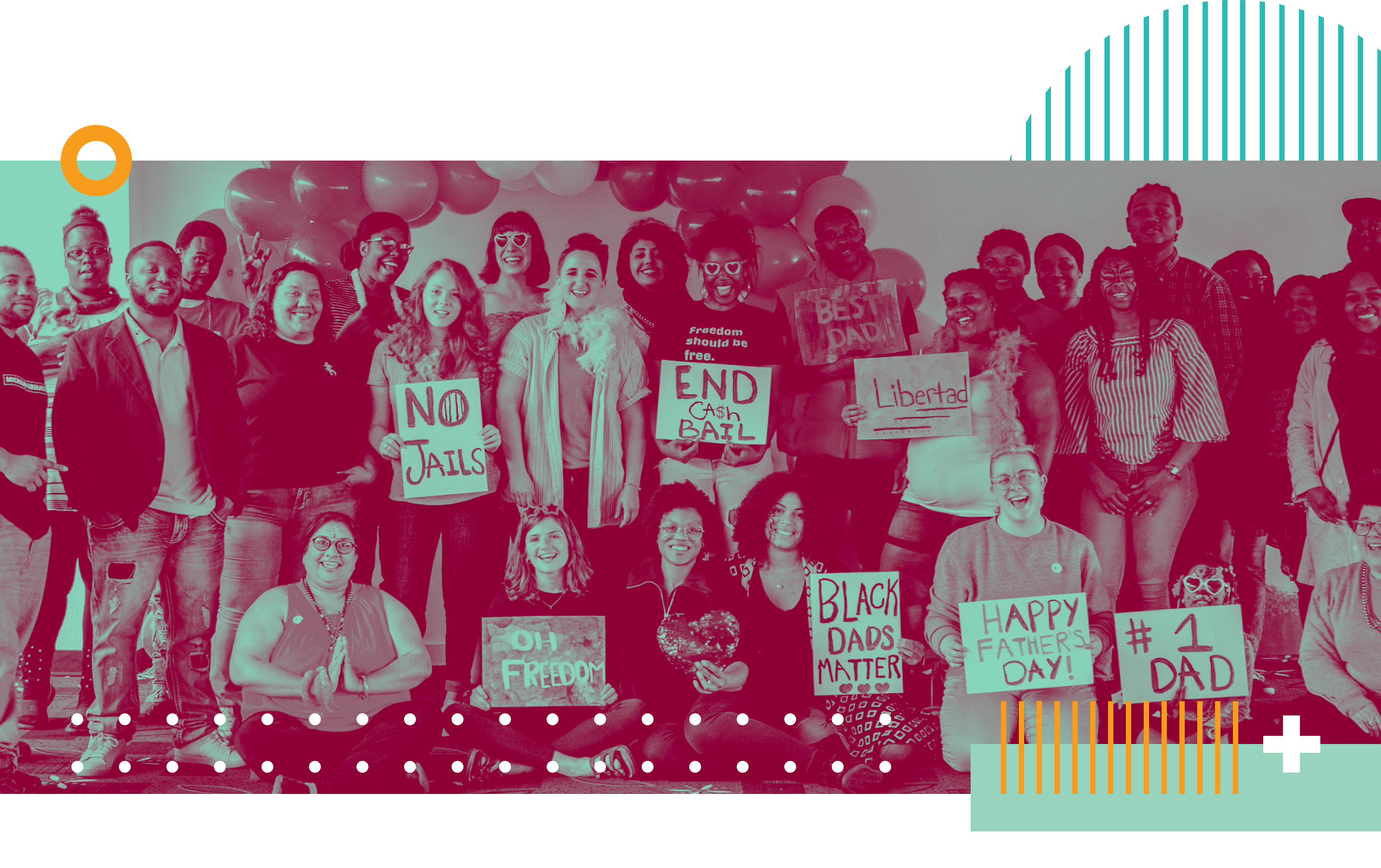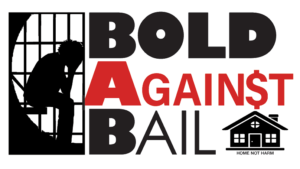
A key aspect of our work involves collaborating on campaigns that center the needs, wisdom, and vision of our clients and community partners. Our campaigns and advocacy work include building partnerships and hosting and participating in community events and education. We have participated in people’s forums, coalition building, community surveys, policy advocacy, direct action, and cultural organizing. For us, it is crucial that we celebrate our clients’ stories through events like the Father’s Day Bailout and our workshop with the People’s Paper Co-op. Additionally, we engage in close collaboration with movement-building organizations on a local, statewide, and national level to determine how we can best advocate for their legal needs.
In the U.S., there are 462,000 people currently incarcerated in our county jail systems pre-trial, meaning they haven’t been convicted of a crime but are often being held simply because they can’t afford to post bail. While those who can afford bail are able to await trial at home, those who cannot are forced to do one of 3 things:
Unfortunately, when folks are forced to stay in jail because they can’t afford bail, they can lose their jobs, housing, and even their children. In Wayne County, 62% of the people currently incarcerated in the Wayne County jail are there pretrial.

The Bold Against Bail Coalition is a partnership between Michigan Liberation, the Detroit Justice Center, the Advancement project, and the Bail Project which seeks to build state-wide momentum to pass expansive and comprehensive bail reform in Michigan. Collectively, we are building a campaign to call attention to the harms of the cash bail system and demand a change in laws and practices – eliminating cash bail use throughout Michigan
Sign the Bold Against Bail pledge today to signify your support of the movement and receive updates on BAB engagement opportunities.
In 2022, DJC’s Founder Amanda Alexander worked with Robin Steinberg, Executive Director of The Bail Project to write a letter to State Representative David LaGrand addressing our concerns with his proposed bail reform policy changes seen in Michigan House Bills 6455-6463.
Among other issues in the proposed bills, we were very concerned with the use of individualized risk assessment tools, which have been proven to exhibit racial bias despite claims that the algorithm does away with implicit bias. Additionally, the proposed bills dictate that cost savings from bail reform be redirected into the budgets of law enforcement, when there are a number of crucial services that money could be used for that would provide actual community safety.
Clean Slate is an effort to pass expansive and automatic legislation that allows people living with criminal records a life without collateral consequences — a clean slate.
Currently in Michigan, access to expungement is costly, narrow, and complicated. The majority of people living with a criminal record don’t actually have access to expungement.
Under the current law: You can only have your record expunged if you have:
no more than 1 felony OR 2 misdemeanors convictions (traffic violations not included amongst other felonies).
IF you are eligible, it is often a very difficult and costly process that can turn folks away. At minimum, there are processing fees and fingerprinting costs, while the average law office charges around $1000 for expungement services in Michigan.
With the lack of access to expungement comes a life of collateral consequences and discrimination (housing, employment, education), which often lead to recidivism. People should not still be affected by a legal mistake that happened years ago.
In 2019, DJC’s Executive Director Amanda Alexander worked with Robin Steinberg, Executive Director of The Bail Project to write a letter to State Representative David LaGrand addressing our concerns with his proposed bail reform policy changes seen in Michigan House Bills 6455-6463.
Take a look at a two-day advocacy workshop co-hosted by DJC and People’s Paper Co-Op, where formerly incarcerated people took their criminal records and made new paper from them, signifying what freedom can look like once someone’s record is expunged.
Have you or your loved ones been impacted by incarceration? We need your voices to ensure the current legislation reflects the needs of our communities! Follow our calendar for updates or reach out to us here.
Water justice is one of the most gripping issues facing Michigan today, and we take the lead from the water warriors who have worked tirelessly for many years to ensure the rights of every Michigander to clean, drinkable water. While our Community Legal Advocates work to help Detroiters keep their water on, we have also signed on to a joint letter with ACLU Michigan, Sugar Law Center, and several other law offices demanding that the Michigan Department of Health and Human Services (MDHSS) end all water shutoffs in Detroit because they create a catastrophic public health crisis. We are also working with that same team of lawyers and activists to present policy demands to Governor Whitmer, to end shutoffs and make water affordable throughout the State.
In 2019, DJC and 11 other civil rights organizations signed a letter to the Detroit Board of Police Commissioners in opposition to the use of facial recognition technology on the grounds that it is racially biased and poses a grave threat to privacy.
In addition to DJC, the coalition included the Arab American Civil Rights League (ACRL), Arab Community Center for Economic and Social Services (ACCESS), ACLU of Michigan, CAIR Michigan, Color Of Change, Detroit Community Technology Project, Detroit Hispanic Development Center, Michigan Immigrant Rights Center, Michigan United, Metropolitan Organizing Strategy Enabling Strength (MOSES), and We The People – Michigan.
This broad coalition united in opposition due to the disproportionate impact the use of facial recognition technology will have on communities of color and immigrants, who already are subjected to over-policing. Peer-reviewed studies have shown this technology inaccurately identifies people of color and women, and the coalition pointed out in our letter that this technology would lead to false identifications and heighten racially discriminatory policing in Detroit, a predominantly Black city, as well as subject immigrant communities to enforcement actions by federal agencies such as U.S. Immigration and Customs Enforcement (ICE) and Customs and Border Patrol. We urged the board to follow the lead of San Francisco, Oakland, and Somerville, Massachusetts, which have banned police use of facial recognition technology.
— Eric Williams, senior staff attorney for the Detroit Justice Center’s Economic Equity Practice
Shotspotter is an audio surveillance technology that police use to detect the sound of gunfire. Police then respond to the sound after receiving targeted GPS location information. In late 2020, the Detroit Police Department adopted this technology, allocating $1.5 million for its use. It has since expanded to two districts in the city while pushing to increase the use of the technology by using $7 million from federal pandemic relief funds. Here at the Detroit Justice Center, we are a part of a coalition in Detroit to stop the use of Shotspotter altogether, as we know it’s a technology used to over-police Black and Brown communities, including the increased use of stop-and-frisk policies.
Even if Shotspotter worked the way police claim it does, it still raises the surveillance apparatus of law enforcement and violates civil liberties. Additionally, this technology has not decreased violent crime in cities like St. Louis, Memphis, and Atlanta. Since DJC’s inception, we’ve fought against DPD’s costly surveillance apparatus and continue to do so with this campaign. DPD continues its PR campaign to argue that Shotspotter has decreased gun violence in the city without showing any tangible proof to their claims. While Shotspotter claims to have 97% accuracy in detecting gunshot sounds, they’ve never tested the technology to see if it can differentiate between gunfire and fireworks or other loud sounds.